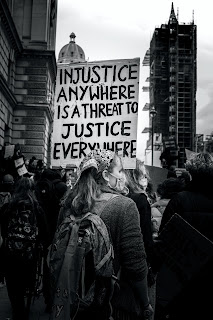Day 21 – Critical consciousness: The importance of viewing the systemic web
 |
| Photo by RhondaK Native Florida Folk Artist on Unsplash |
I’ve spent the day reading Shapiro’s (2020) chapter on Liberation psychology, creativity, and arts-based activism and artivism. It was dense reading – and while I recognize that she is coming to this work as a “cultural practitioner” who applies “critical–participatory pedagogies to appreciate how cultural and spiritual creative resources promoting both continuity and innovation during life course transitions support positive development and wellness” (p.247), I felt that the writing had a lot to offer – and maybe even offered one definition of expressive arts therapy.
Expressive arts therapy utilizes creative methods to facilitate “deep reflection on lived experiences sensitive to social context, emotional engagement in equitable relationships based on trust, and collaborative learning re-visioning possibilities while inspiring social action” (Shapiro, 2020, p. 250).
I love the notion of “deep reflection on lived experiences sensitive to social context.” I work at a Boston charter high school one day a week, seeing kids who are willing to participate in counseling. We talk, we play, we make art. I absolutely see my work with these kids as “deep reflection on lived experiences sensitive to social context.” I also feel it is “emotional engagement in a relationship based on trust.” Is it equitable?? It is not. I get paid for my work with them, they do not. I have several ethical obligations related to our roles (mine as mental health counselor and theirs as clients). Of course, these ethical dynamics do not diminish our mutual need for trust and respect. Lastly, are we “collaboratively learning to re-vision possibilities” for their lives? And is that “social action?” I say, Yes!
I also believe it is my job (and ethical obligation) to believe in and offer creative methods for deep reflection, emotional engagement, relationship, collaboration, and re-visoning. If I am being true to my beliefs about the power of change, I have to trust and respect the relationship to the arts that already exists within me, the kids I work with, the larger community, and the world.
I also believe that all of these notions – creative methods, creativity, facilitation, deep reflection, lived experience, social context, emotional engagement, relationship, trust, collaborative learning, re-visioning and social action all require “critical consciousness!”
Shapiro, E. R. (2020). Liberation psychology, creativity, and arts-based activism and artivism: Culturally meaningful methods connecting personal development and social change. In Liberation psychology: Theory, method, practice, and social justice. (pp. 247–264). American Psychological Association. https://doi-org.ezproxyles.flo.org/10.1037/0000198-014



Comments